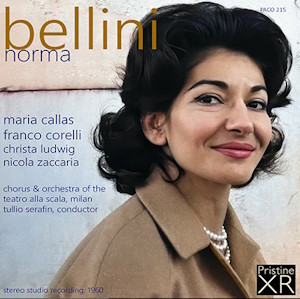
Vincenzo Bellini (1801 – 1835)
Norma (1831)
Norma – Maria Callas (soprano)
Pollione – Franco Corelli (tenor)
Adalgisa – Christa Ludwig (mezzo-soprano)
Oroveso – Nicola Zaccaria (bass)
Flavio – Piero De Palma (tenor)
Clotilde – Edda Vincenzi (soprano)
Chorus and Orchestra of Teatro alla Scala/Tullio Serafin
rec. 1960, in studio, XR Remastering
Reviewed as 24-bit FLAC download
Pristine Audio PACO215 [3 CDs: 161]
This was my first choice of recording in my survey of Norma and I reproduce here my assessment of it before adding a few more comments:
“This recording has the advantage of being studio recorded in good stereo sound – very welcome after all those tinny, live mono recordings – and also partners Callas with superlative singers in Corelli, Ludwig and – for the third time – Zaccaria. Callas’ voice had not so much deteriorated by the time of this recording, apart from a few flapping top notes; the decline in her voice was not a linear process, as her later recordings of La gioconda and the 1960 Norma testify, Furthermore, there are huge compensations in the delicacy of her characterisation; she introduces new subtleties and even when her voice does not quite do her bidding you can sense the emotions guiding it.
The cast here is glamorous and indeed there is an air of glamour about the whole thing, starting with Corelli’s glorious tenor. I just drink in Corelli’s voice and when he obliges us by sailing up to the top C that occurs a few bars into his first aria, “Meco all’altar di Venere”, I can’t stop grinning. There is a such pathos, such tenderness, such a depth of suffering in Callas’ vocalisation that I can easily forgive the odd wobble and a little loosening. Ludwig was a clever and unexpected choice; she has depth of tone without sounding the least bit too old and the role sits squarely in the middle of her lustrous mezzo-soprano and the fervent feeling with which she invests “Deh, proteggemi, O Dio!” matches Callas for intensity. Serafin has the advantage of an orchestra which plays beautifully and he supports his singers ideally without unduly lingering. The cumulative combination of the advantages of this recording makes it highly desirable.”
Of course, the issue here is to what degree Pristine has been able to enhance an already acceptable stereo recording. Certainly it has greater depth and richness and there is very little hiss and the merest rumble – the occasional bit of traffic noise also being more audibly revealed – though I do find the suggestion of an excessive added reverberance slightly wearing on the ear compared with the Warner issue. Reacquaintance with it has refreshed my admiration for its virtues, not least the thrilling freedom of Corelli’s singing and Callas’ constant illumination of the meaning and emotion behind the text, while minimising the listener’s objections to the occasional frailty of those wobbling top notes. “Casta diva” is a miracle of expressive nuance and its repeated top As and B flats are fine – just the top Cs flap a bit in the cavatina “A bello a me ritorna”.
The glamour of Ludwig’s mezzo on her first entry strikes the listener afresh in this remastering. Indeed everything, such as the crucial exchanges between the three main characters in this love triangle and the achingly melancholy introduction to the second act, emerges more vividly and the few wince-occasioning moments pale into insignificance. What you remember are moments such as the horror in Callas’ voice when Norma desperately rejects the idea of exacting revenge upon the faithless Pollione by murdering their children: “Ah no! Son miei figli!” In addition to the relentless drama inherent in what is one of opera’s better plots is the constant stream of memorable melody, so expertly delivered by the stellar voices here.
Ralph Moore
Availability: Pristine Classical


















